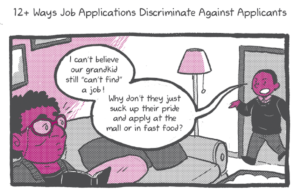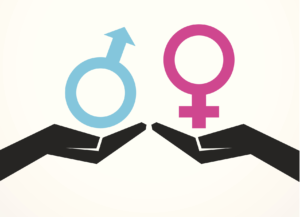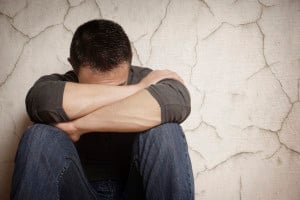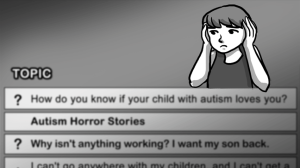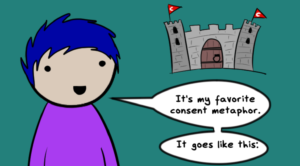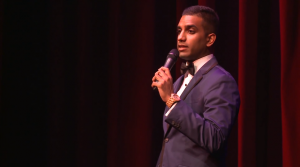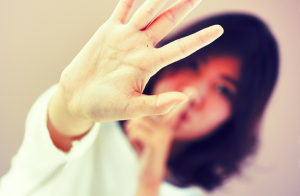Originally published on Sunnydrake.com and republished here with the author’s permission.
I was at a gathering a few weeks ago talking with two friends, one of whom I’d just met that evening.
One of them mentioned that she had a zit on her face, and our new friend offered a great home remedy: “Just dab brandy on it.”
After a moment’s awkward silence, me and my friend burst into laughter and proceeded to egg each other on with new rationales for getting brandy all over us. “Well, I think I have a zit right in my mouth, under my tongue.”
We are both in recovery from drinking problems/alcoholism.
Last month, I celebrated my one year of sobriety. I’m grateful to finally be at the point where I can joke about it and talk freely with friends and family, instead of the crushing shame I used to feel.
In fact, a little over a year ago, I woke up, half drowned in a pool of my own shame.
I’m taking this opportunity to reflect on my journey to sobriety, look at community roles in drinking, harm minimization, and sobriety – including challenging the ways that we fail each other and also the ways we are amazing.
Harm minimization (see note 2 below for definition) works for many people, and I wholeheartedly support it as a great option. For me, it wasn’t working anymore.
I’d made (and broken) every cut-back-on-drinking type of rule imaginable. Rules like “No drinking before 5pm” became “Do you think it’d be okay to make that 4pm?” Rules like “No sending texts, e-mails, or posting on Facebook when I’m drunk” became “Except when I’ve read it several times, and I think it’s really a good idea.” Mornings were punctuated by scouring the sent folders in my phone and e-mail to see what mayhem I’d been up to.
The rules became increasingly ridiculous. “I can break one rule if I’m having a really shitty week or someone de-friends me on Facebook.” (Okay, so that wasn’t actually a rule, but you get the point!)
I’d made bold declarations. I’d made threats to myself. I’d punished myself. I’d done sober “drinking break” periods to prove that I could, always falling straight back in to the deep end, noticing each time that the bottom was deeper than the last time.
I even made a theatre show about it! I hoped that creating a show would lessen my drinking, help me get through it. In reality, initially my drinking got worse. Making the show was such a stressful process that my drinking escalated. I couldn’t wait to go home after each rehearsal to my beloved bourbon.
Eventually, I came to the realization that harm minimization wasn’t working for me anymore, and I wanted quit long term.
In my first attempt, I remember thinking, “What do you do when you break up with a person? Break-up sex!” Perfect! So, I attempted a last romantic evening with alcohol. I turned my phone off. Wrote a love poem to my darling bourbon. Carefully selected a music playlist. Then luxuriated with my “last bottle” of bourbon. A week later, I was drinking again.
To be clear, I absolutely and adamantly support people’s right to use whatever coping strategy feels best to them at any given time. I also support the safety and happiness of the friends and family of people with substance challenges. Sometimes, these can coexist well – and other times, people’s substance use can have great impacts on their loved ones.
Conversely, the patronizing and judgmental attitudes of the loved ones can be just as harmful to people struggling with alcohol or substances.
There is a big difference between asking somebody to be accountable for their behavior when it is affecting others, versus judgmentally demonizing a person’s choice to use alcohol or drugs to cope with (or enjoy) their life.
The clearest example I can give of this difference was in a conversation I had with a friend who came and saw my theatre show about drinking (and addiction to sex and work and cell phones), X.
After the show, she confided in me that her partner had a drinking problem, which had crept in over the years. When she tried to bring it up with her partner, he was very defensive and irritated.
I asked how his drinking was affecting my friend.
There were certainly some things that he was doing that were not ideal, like spending their shared money on alcohol, but when we discussed it further, the real heart of the problem was that she felt ashamed about having a partner with a drinking problem.
She went on to acknowledge that her partner was actually a lot more chilled out when drinking, and that it was a bunch of her own stigma around the alcohol that was the challenge.
I encouraged her to unpack this further and take on doing the work of de-stigmatizing alcohol and addiction, find ways to express support and keep an open mind and heart with her partner.
Simultaneously, I encouraged her to stand strong (with my support if she wanted it) on asking for him to be accountable for his behavior and make sure that her needs, safety, and financial security were addressed. It turns out these things were not in significant competition.
So how do we support each other when our drinking gets out of hand?
Here’s my simplest declaration to allies, based on my experience: If we trust you won’t judge us, we will be more likely confide in you about our drinking problems.
Let us feel your support, your open mindedness, and let us know that you have our backs. Let us feel your love.
Then, and only then, can we begin to have conversations about whether we want to continue the same way, cut back, minimize harm, or quit altogether – and figure out the strategies to get there.
As to what these strategies and approaches are: We need a myriad of approaches and tools and strategies at our disposal, because let’s remember that addiction happens with in the context of the stuff going on in people’s lives (like experiencing homophobia, racism, colonialism, transphobia, poverty, recovering from trauma, or self-medicating for stress and anxiety), so our approaches will look different depending on who we are and what’s going on.
Here’s a few things I’ve learned from my experience.
1. Don’t Judge Us
I think the single most important thing is being truly non-judgmental.
I could sniff out disapproval and judgmentalness from a mile away!
Anyone who I perceived was likely to judge me, or who I heard belittling (even subtly) people with drinking or drug problems, instantly went on a mental list of people to hide my drinking problem from.
Saying that you’re not judgmental is not enough.
All of us have unpacking to do of our internal attitudes towards people with alcohol and substance problems, particularly towards drug users.
It’s not possible to grow up in the world that we do and be immune to the intense stigma of “junkies” being pretty close to the bottom of pile of society, with alcoholics somewhere down there as well.
The single greatest barrier I had to getting sober was the intense shame I felt about my drinking. I literally started to drown in my shame.
My shame meant that I denied my problem to myself for a long time – and then hid it from all of you for even longer.
2. Unpack Classist, Racist Ideas about Alcohol and Drug Use
The times when I finally started to speak about it, I had challenges even convincing some of my friends that I really and truly had an increasingly dangerous drinking problem.
I don’t fit people’s racist, classist, and colonial ideas of what an alcoholic looks like.
I’m a white dude who managed to get a lot of “productive” shit done whilst desperately struggling with my alcohol problem. The fact that my friends didn’t really believe me was a shallow comfort to me (because I could stay in denial) but ultimately, not helpful.
Also, check your assumptions before making assessments about whether or not others are struggling with their alcohol or drug use. Remember how ideas about race, class, gender, disability, and other identities play into how we view people.
Many Black and Indigenous people and People of Color get stereotyped as drunks and junkies. Did you know, for example, that more Aboriginal people in Australia abstain from alcohol than non-Aboriginal people?
Yet if you listened to the media or the government’s racist intervention in the Northern Territory, you’d get a very different picture.
I heard of an Indigenous friend saying, Mmy people don’t have a problem with alcohol. We have a problem with colonization.”
So, as a white person, if I actually want to be an ally, I should be challenging colonization and supporting the autonomy and leadership of Indigenous communities, not trying to be the white savior swooping in, “helping” with drinking problems.
3. Ask What Kind of Support They Want or Need
Once I truly believed that someone wasn’t judging me, offers of direct support were very useful. Not a carbon copy “one size fits all approach,” but actually genuinely enquiring what sort of support would be helpful.
One of my friends recently asked me what I would like her to do if I started drinking again. She prefaced it by saying that she has a tendency to respect other people’s autonomy and under intervene. My partner asked the same thing.
Because I trusted them both, I’ve been able to make a request which, whilst it felt humiliating and scary, also feels empowering.
They’ve both agreed if they see me about to drink or with some alcohol in my hand, to physically take it away from me and do whatever they need to stop me from having access to the alcohol in that moment.
Now that I made the request, and it actually wasn’t that big a deal, I’m reflecting on that feel so humiliating? Hello, internalized ableism!
So what if I can’t do it on my own? The idea that we can be self-sufficient is bullshit anyway.
Even now, I just deleted this entire paragraph, because I was embarrassed for you to know that I need help and support. I put the paragraph back in because I’m committed to transforming that internalized ableism and those feelings of humiliation – and changing the way I see myself and others.
It’s okay to need help!
4. Help Them Find Other People Who Get It
Even though making my theatre show, X, initially escalated my drinking, ultimately it may have saved my life. It was the show that connected me to other people who struggle with addiction.
My passion for my work and my community made me rise above the choppy waves of shame which were threatening to dunk me under for good.
Whilst I’m clear that the actual theatre piece itself is very different to my own therapy, the process of researching and making the show was completely essential in my getting sober.
I interviewed over 40 queer and trans people about addiction. Through performing X, a wide array of people have written me letters and talked to me about their struggles. They tell about the importance of having stories on stage in helping them to feel less isolated and ashamed. Well, my friends, your stories are just as important to me.
I will also be forever grateful to the generosity of the people I met at AA where I participated for the first three months of my sobriety. Whilst I have ultimately decided (for a variety of reasons) that AA is not a structure that works for me ongoingly, I don’t know if I could have gotten sober without the love and support I encountered in those dusty church basements and town halls.
The tips and tools were super useful, but the heart of what I got from connecting with other alcoholics was non-judgmental space to talk freely.
I literally began to swim to the edge to the deep pool of shame that I’d been treading water in. I was finally able to climb onto the shore, soaked and gasping for air
Without fellow alcoholics, I would never have found my way to dry ground again.
I got to see that sobriety wasn’t the boring, stagnant lifestyle that I’d feared. I was deeply inspired by the humility of my fellow alcoholics. What an awesome bunch of people we are!
Like, seriously. So many moving and beautiful stories.
5. Work on Balancing Sober Space with User/Drinker Rights
So how do we create inclusive spaces that feel safe and welcoming for a whole myriad of people, both those who are in recovery and sober as well as those who can’t or choose not to function without alcohol and substances?
I asked this question of a friend, Geoff, who is part of a Toronto-based sobriety collective, and he suggested taking a similar approach to many AA meetings: Have more events that are designated sober spaces (no alcohol served), but that if somebody turns up drunk, they are not kicked out of the space and are still welcome.
I am horrified that some of my trans heroes – those who have paved the way for many of us to be out as trans and queer – were in fact banned and pushed out of spaces and movements because of their drug and alcohol use.
Sylvia Rivera and Marsha P. Johnson, both trans women of color on the frontline of the 1969 Stonewall riots, were banned from various LGBTQIA+ spaces, including for their drinking and/or drug use.
And these are people who we owe our lives to! These are women who fought, tooth and nail, for our rights.
I’m ashamed to think that we fail so spectacularly as to push further to the margins our siblings and Elders who should have the warmest place by the fire.
Let’s change this!
***
Dear people struggling with alcohol or drugs (whether still drinking/using or not):
I want to personally apologize for the times when I have not challenged my own judgmental attitudes about myself and you. Because in truth, we are awesome.
We are living in some really shitty times, and I believe what we need the most to transform our world is creativity, strength, and resilience – which you are the very embodiment of.
You are necessary. You are loved. You are important. You are my heroes. You are part of the revolution. The revolution will not happen without you, because it can not, because you are smart, fierce, awesome, and you are everywhere.
Thank you!
All my love,
Sunny
***
Note 1: There are also more ideas in my follow-up article, “Wet Dry.”
Note 2: Harm minimization or harm reduction refers to a range of strategies to reduce or minimize some of the harmful affects of drinking or drug use. Lots of government and conservative agencies/groups refuse to support harm minimization and are only in favor of abstinence (not using at all, or alcoholics not drinking at all), and not only stigmatize but criminalize harm minimization.
For example, many places won’t allow safe injection sites. This “abstinence is the only way” model can be used as a justification for the war on drug users which is in reality turned into a war on Indigenous and Black people (who actually use fewer drugs than white people, but get thrown in jail way more than white folks for using or dealing). Thanks to Chanelle for schooling me on these politics of criminalization and harm minimization.
[do_widget id=’text-101′]
Sunny Drake is an Australian born trans queer femme writer, performer & producer. Now based in Toronto, he’s toured his award-winning theatre shows extensively in Canada, Australia, the USA, Puerto Rico and Europe. He is also the author of a blog which weaves trans and queer politics with personal story (www.sunnydrake.com). Follow him on Twitter @sunny_drake.
Search our 3000+ articles!
Read our articles about:
Our online racial justice training
Used by hundreds of universities, non-profits, and businesses.
Click to learn more






